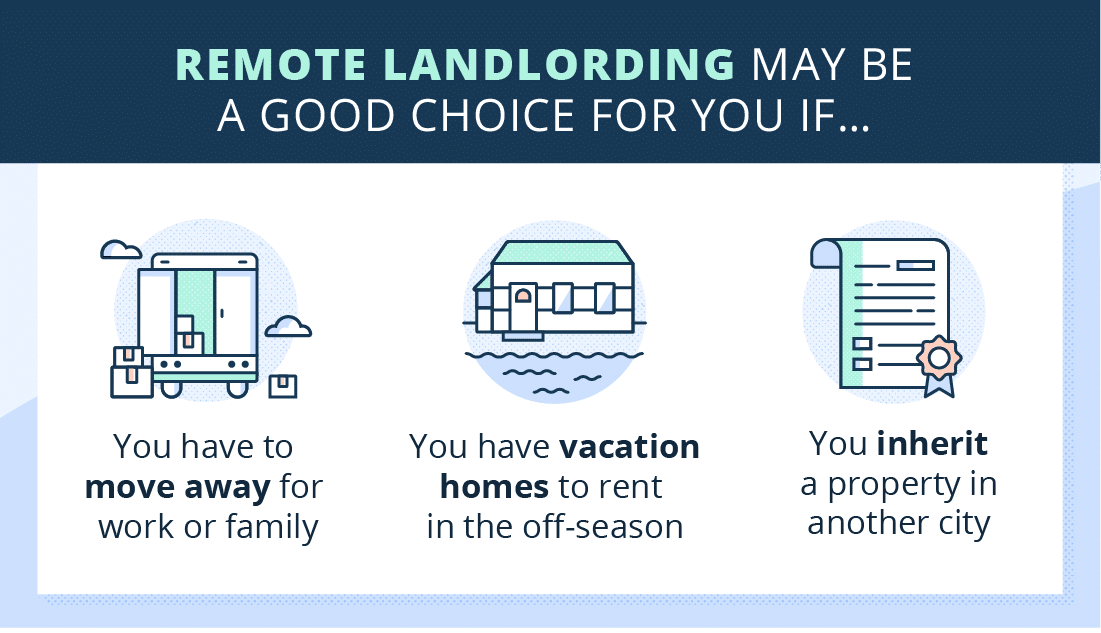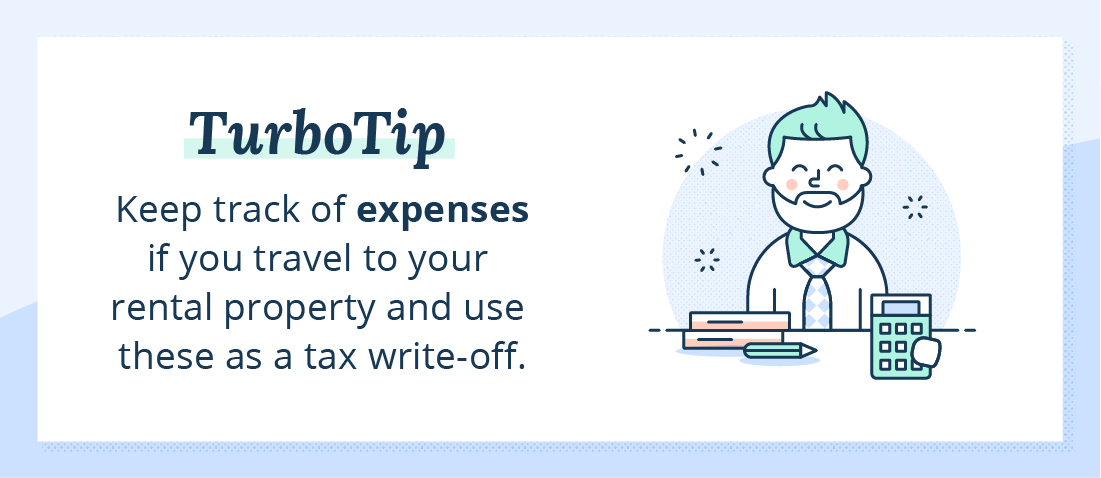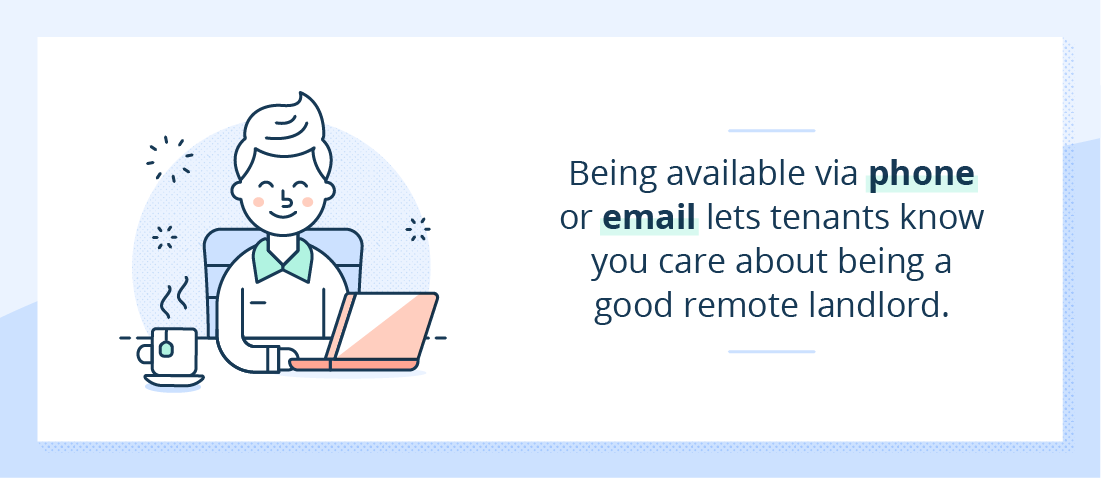As you expand your building portfolio, you may find yourself looking at remote properties. Perhaps you bought a property in the city you live in, but now you are contemplating a move to a new location and wonder if you should still manage your current rental as a remote landlord. Although managing properties from afar can seem like an impossible task, the reality is that with the proper tools, you can become an accomplished remote landlord.
Reasons You Might Own Remote Properties
Though being a remote landlord isn’t usually an ideal situation, it can happen from time to time for a variety of reasons. The most common circumstances you may find yourself in include:
- Moving for work: If you or your partner gets a job in a new city, you may need to relocate depending on how far away it is. This can be tricky if you own properties in your current city and have to move away.
- Vacation or temporary homes: You may have multiple properties that you only live in for a few months of the year, such as summer and winter homes. Many landlords choose to rent these out during the off-seasons as an extra or full-time income.
- Property inheritance: If a friend or relative passes away and leaves their property to you, there’s a good chance you don’t live in the same area and will have to manage it remotely.
If you are considering being a remote landlord, check out these 10 tips that can help you better manage your remote properties even from a far away location.
10 Tips for Being a Successful Remote Landlord
Below are some tried and true strategies for ensuring your property is maintained even if you aren’t on-site to personally take care of it.
1. Utilize Landlord Technology
The good news is that our modern, technology-driven world actually makes the process of managing a property remotely easier than it ever has been. When you start the rental process you will need to begin with marketing. To market your property, use an online platform that allows you to syndicate your listing out across the web. The more places you have your property listed, the better. Renters are looking for properties online, so your marketing can be done remotely without any issue.
Once you have a tenant in place, use an online landlord software to manage the property. Having the ability to accept rental applications and screen tenants through the internet will make being a remote landlord much easier. In particular, providing your tenants with the ability to pay their rent online is an excellent solution for remote landlords. There will be less worry about checks “getting lost in the mail” and accepting online rental payments is an incredible time-saver.
2. Make Sure the Price is Right
If you’re managing remote properties in a new city, or if you’ve moved and have been out of the industry loop for a while, it’s important to do your research and check in on the real estate market for your city. You can do this by researching average rent prices for your city online, as well as taking a look at what other properties in your area are listed for.
You’ll, of course, need to consider your remote property’s specific location, size, and amenities, and compare it to properties of similar value. If your price is listed too high, you won’t be able to attract quality tenants, but if it’s too low you run the risk of losing out on essential income.
3. Visit the Remote Property Every Year
Though modern technology makes being a remote landlord easier than ever, there’s still nothing that can compare to evaluating the property in person. If you’re managing a property from afar, you’ll want to visit at least once per year, if not more frequently, to make sure everything is staying up-to-date and in shape.
This is a great way to show your tenants that you care about their wellbeing, and also that you will continue to hold them accountable even if you are managing remotely.
4. Ensure Trips to the Property are Tax-Deductible
To go along with the previous tip, you should make sure to keep track of all of your expenses when traveling to visit your remote properties. Save receipts and use the trip as a business write-off. This can be particularly opportune if you planned on taking a trip to the location already.
For example, you can schedule your trip to handle property-related tasks, and at the same time visit friends or family in the area. Then, using your business-related expenses, write the trip off for tax purposes.
5. Plan Ahead for Showings or Phone a Friend
One of the harder aspects of managing a property remotely is handling the showings. If you choose to manage this on your own, your best bet is to take a trip to your property and schedule a weekend of showings. Set up two times over the weekend when the property will be available for potential tenants to come by.
For example, you could have an open house on Saturday from 10 am – 4 pm and Sunday from 11 am – 6 pm to give people a window of time to come to check the place out. Tell any interested parties about the showings ahead of time so that you can knock it all out at once.
During this trip, have a plan of action ready for parties who are interested in the property. Provide them with an online rental application they can fill out to save time and get the ball rolling.
Another strategy is to have your current tenants agree to show the property to interested parties. In this scenario, you may need to provide your old tenants with an incentive for showing the property, such as a discounted last month of rent. You will also want to be careful you are not overwhelming your current tenants with too many showings.
Another option is to hire someone in the area to show your property, such as a real estate agent, or ask someone you know in the area like a family member or friend. If you choose to have your current tenants, an agent, or family and friends show the property for you, you can simply schedule a trip to meet your new tenants at their move-in date.
This gives you a chance to do a move-out walkthrough with your old tenants, arrange for any repairs needed, and do a move-in walkthrough with your new tenants. With this method, you can easily accomplish all these steps within a few days.
6. Create a List of Local Contacts
One of the other tasks you will need to keep up with as a remote landlord is ongoing maintenance for your tenants. Make sure you create a list of reliable contacts who live where your rental property is located. You will need contractors you trust for HVAC, plumbing, and general repairs.
Because you won’t be there to oversee projects, once you find a good contractor you should save their information and work on building a relationship with them. If you have family or friends who live in the area, you can also ask them to check up on the property every now and again and oversee any repairs.
7. Invest in a Home Warranty
If you don’t feel like you have strong enough relationships with contractors in the property area, or if you don’t have the time to build up a list of contacts, investing in a home warranty can be an attractive option. You can think of home warranties like “repair subscriptions,” you purchase a yearly plan from a company and in return, they agree to conduct repairs around the property.
Many home warranties have basic and premium plans, which cover a variety of different types of repairs including HVAC, plumbing, washer and dryer issues, etc. More expensive plans will cover more niche repairs like swimming pools and roof repair.
Find the best home warranty for your rentals >>
8. Don’t Relax the Rules
Just because you aren’t there to monitor the property in person, doesn’t mean you should let tenants slack off on paying rent on time and respecting their neighbors. Even as a remote landlord, you are still responsible for what goes on at your property and allowing tenants to think you’ve adopted an “out of sight, out of mind” mentality can set a dangerous precedent.
9. Communication is Everything
To go along with the previous point, maintaining healthy levels of communication with tenants is the key to succeeding as a remote landlord. If an issue on the remote property comes up, such as a repair or conflict between residents, you should be available to resolve the issue just like you would be if you were there in person.
Being responsive via email or phone allows tenants to feel confident that you’re committed to being a good landlord, and lets them know that you’re keeping on eye on things and that all the rules in the lease still apply when you’re not there.
10. Strive to Keep Quality Tenants
The hardest part of managing a remote property is the work involved in the turnover of tenants. When you find quality tenants who pay their rent on time and treat the property responsibly, strive to keep them around. For example, if you’d normally be considering a major price hike in rent, consider a lower rent increase when their lease comes up for renewal. If the water heater on the property is in need of replacement, consider upgrading to a more energy-efficient solution to keep tenants around.
Even if you have to invest a little money upfront to keep tenants happy, it will be worth it in the savings you will gain from not having a vacant unit. Responsible tenants are worth their weight in gold, so take the time to ensure they are happy with arrangements.
We hope these tips and resources help you succeed as a remote landlord, whatever your situation may be. For more landlord tips and resources, visit our education center.












